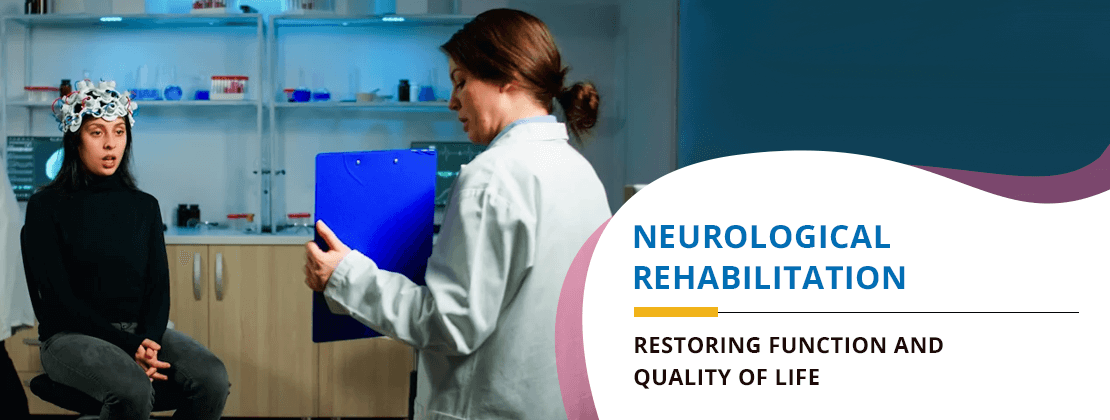
Home / Blog / Neurological Rehabilitation: Restoring Function and Quality of Life
Neurological disorders, encompassing conditions from stroke to Parkinson’s disease, can have a profound impact on the life of the patient. Thankfully, advancements in medical science have birthed the field of neurological rehabilitation, a doctor-supervised program designed for people with diseases, trauma, or disorders of the nervous system. Its primary goal is to help patients return to the highest level of function and independence while improving their overall quality of life – physically, emotionally, and socially.
Table of Contents
The neurological rehabilitation process is designed to meet the individual needs of the patient, depending on the specific neurological condition and its severity. After a comprehensive assessment by a neuro physician, a tailored rehabilitation program is developed. The process may include managing basic body functions, relearning skills, or even modifying the home environment to make daily activities easier.
The rehabilitation team is composed of diverse healthcare professionals, each contributing their unique expertise to the patient’s recovery. This team may include neurologists, rehabilitation nurses, physical therapists, occupational therapists, speech and language pathologists, psychologists, and social workers, all working together to help the patient regain independence.
Rehabilitation programs often involve several types of therapies. Physical therapy aims to improve strength, balance, mobility, and endurance. Occupational therapy helps with mastering daily activities such as eating, dressing, and bathing. Speech and language therapy assists with problems in speaking, swallowing, or loss of memory. Furthermore, therapeutic recreation specialists may be involved to help patients return to leisure activities.
Neurological rehabilitation can be a key component of the treatment plan for a variety of neurological disorders including stroke, traumatic brain injury, multiple sclerosis, Parkinson’s disease, Guillain-Barre syndrome, and many others.
An essential element of any successful neurological rehabilitation program is the participation of the patient and their family. They need to be actively involved in the treatment process, adhering to therapy schedules, practising exercises at home, and maintaining a positive outlook to overcome challenges.
Neurological rehabilitation has a profound impact on the patient’s life. It can help restore lost abilities, improve functionality, enhance independence, and boost self-confidence. It’s a journey towards reclaiming one’s life from the grips of a neurological condition.
At HCG Hospitals, we understand the unique challenges faced by patients with neurological disorders. Our dedicated team of neuro physicians, therapists, and other specialists work collaboratively to design personalized treatment plans. Our state-of-the-art facilities provide a conducive environment for recovery and rehabilitation. We are committed to helping our patients regain their independence and return to a life full of possibilities.
If you or a loved one is facing the challenges of a neurological disorder, remember you’re not alone. There’s a whole team of professionals at HCG Hospitals ready to help you navigate the path towards recovery. Don’t hesitate to reach out to our Department of Neurological Rehabilitation for comprehensive, compassionate care.
At HCG Hospitals, we strive to provide the best care to our patients. If you or a loved one is suffering from a neurological disorder, don’t wait. Contact our Department of Neurology today.